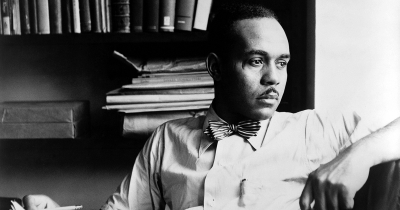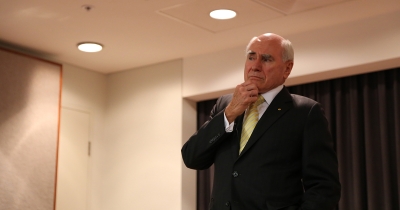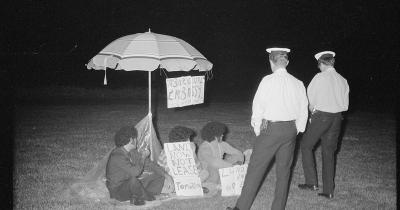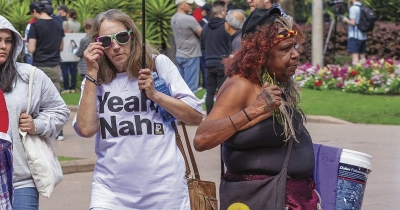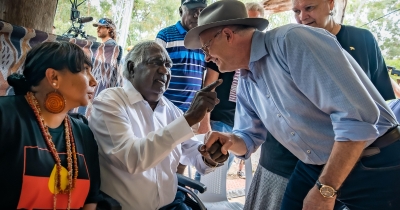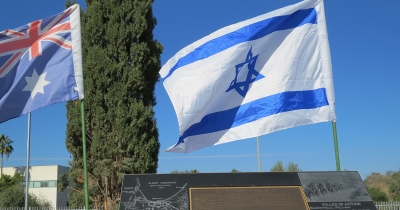Copyright Agency Cultural Fund
Ralph Ellison could be abrasive. His biographer Arnold Rampersad records that James Baldwin thought Ellison ‘the angriest man he knew’. Shirley Hazzard observed that when Ellison was drinking he ‘could become obnoxious very quickly’. His friend Albert Murray recognised something in him that was ‘potentially violent, very violent. He was ready to take on people and use whatever street corner language they understood. He was ready to fight, to come to blows. You really didn’t want to mess with Ralph Ellison.’
... (read more)Why did Australia vote against the Voice referendum?
... (read more)The defeat of the proposal in the recent Aboriginal constitutional referendum was unsurprising given the forces at work, which I discussed in ‘A Referendum in Trouble’ (ABR, July 2023). Most importantly, it lacked the support of the Liberal and National parties once their leaders decided to oppose it, largely for partisan purposes.
... (read more)Do you know whether Aboriginal and Torres Strait Islander peoples are recognised in your state Constitution? If you responded with a mental shrug and a muttered ‘No idea’, then you would fall within the vast majority. In fact, from 2004 to 2016, each Australian state amended its Constitution to insert recognition of their Indigenous peoples. Yet the effect has been negligible and hardly anyone knows it happened. Why?
... (read more)From the age of fifteen until his recent death at the age of seventy-four, the great Yolngu leader Yunupingu (1948–2023) was at the forefront of the struggle to change the Australian legal system in unprecedented ways. In 1963, with his father, Mungurrawuy, he drafted the Yirrkala Bark Petition, which presented to Parliament an eloquent claim for the rights of the Indigenous peoples of Arnhem Land before their country was, without their consent, turned into a bauxite mine. The Bark Petition was no ordinary document. On the one hand, it uses the antiquated language of a traditional ‘humble petition’ to Parliament, concluding in forms of speech that have hardly changed since the seventeenth century: ‘And your petitioners as in duty bound will ever pray.’
... (read more)The stumping of Jonny Bairstow reminded me of reaction chains. Bairstow, in case you didn’t waste winter nights watching the Ashes, was the English batsman controversially stumped by Australian wicketkeeper Alex Carey during the second Test at Lord’s. Pandemonium ensued, with the poohbahs of the Marylebone Cricket Club berating the Australian team during the lunch break as they filed through the holiest of holies, the Long Room. The brouhaha led news bulletins around the cricketing world; even the prime ministers of Australia and the Old Enemy weighed in.
... (read more)Pressure is mounting on the Albanese government to recognise Palestine as a state. Following a resolution moved by Penny Wong, this became ALP party policy in 2021, and it will almost certainly be reaffirmed at this year’s party conference in August. Former Foreign Minister Gareth Evans has written a powerful defence of the policy, which has been assailed, predictably, by the Israel lobby.
... (read more)In 2008, at the Australian zenith of the American custom of rating the first hundred days in power, Kevin Rudd issued a fifty-five-page booklet to mark his new government’s quotidian ton. Inevitably, it proved nothing much at all. Critics said it was both premature and simply validated the critique that Labor under Rudd had ‘hit the ground reviewing’. The Sydney Morning Herald worked out that Rudd had initiated an inquiry every four days, which sounded bad. But after eleven years of John Howard’s government, many things required attention. As Rudd countered, Howard had initiated ‘495 inquiries and reviews in 2005–06 alone’.
... (read more)
